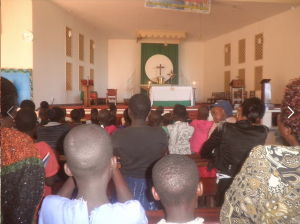“In situation of widespread poverty, the proclamation of Christ
must be the means for restoring human dignity.”
-John Paul II’s Redemtoris Missio #37
 Conscious to our vocation as religious called to spread the good news which emanate from the Eucharist, we are predisposed and unfastened to go anywhere for mission with the aim to proclaim, testify, live out, and share the profound treasures of the Eucharist. Moved by the Spirit who is the principal agent of mission, the Congregation of the Blessed Sacrament has had the opportunity to reach as far as Africa. And fortunately enough, our community in Uganda, East Africa has been fruitful in living out our Eucharistic charism for a valuable fifty (50) years now. Certainly our religious vocations in such place are not intended to be a soft life. The demands it makes on a Priest’s or Brother’s nerve and courage are great, they have to inevitably face the challenge and difficulty, some loneliness, moments of disillusion and hesitation, and even trepidation and disappointment. But amidst all these threats however, we can only claim with the Lord’s promise “do not be afraid, for I am with you.”
Conscious to our vocation as religious called to spread the good news which emanate from the Eucharist, we are predisposed and unfastened to go anywhere for mission with the aim to proclaim, testify, live out, and share the profound treasures of the Eucharist. Moved by the Spirit who is the principal agent of mission, the Congregation of the Blessed Sacrament has had the opportunity to reach as far as Africa. And fortunately enough, our community in Uganda, East Africa has been fruitful in living out our Eucharistic charism for a valuable fifty (50) years now. Certainly our religious vocations in such place are not intended to be a soft life. The demands it makes on a Priest’s or Brother’s nerve and courage are great, they have to inevitably face the challenge and difficulty, some loneliness, moments of disillusion and hesitation, and even trepidation and disappointment. But amidst all these threats however, we can only claim with the Lord’s promise “do not be afraid, for I am with you.”
Not all are called to go for mission outside one’s home country, but to those who are being sent to far places like Africa is indeed an opportunity and at the same time a test of endurance which consequently determines one’s commitment and witnessing to the real essence of religious life. Having embraced this kind of opportunity I have experienced myself the way of life in Africa particularly in Uganda. At the onset of my journey I felt I could only survive for not more than a month because psychologically and emotionally I was threatened by my own misgivings, prejudices and even biases. It was an ordeal to mingle with people absorbed by cultural differences, and a sheer travesty for one who is not used to immerse in a foreign poor land.
Days, weeks, months have passed since the time I landed Uganda, and meeting with people from all walks of life is indeed life-changing. By now a different but affirmative disposition grips into my being more so to my missionary mindset. Appreciation and the desire to live and serve with the people have become my preoccupation. Realizing the value of giving out of my own self for whatever legitimate means of service enkindles the very purpose of my mission. Actually this service embodies the Eucharistic charism that I am committed to adhere as a religious of the Congregation. And to lose out consciously this Eucharistic value will ultimately wanes out the anticipated fruition of the Eucharist that we celebrate.
 Even if one has not personally visited Africa or has seen or tasted their way of living, our common assessment of this part of the world maybe similar. Flat, grey, dusty, disease-stricken, undeveloped – yes to some extent these are true. But interestingly enough, people survive. As much as they could, faith in God has been their strongest claim of countenance albeit the adverse impact of economic, environmental, and political uproar of the country. Moreover, amidst all these challenges and difficulties encountered by people, our Eucharistic apostolate and presence continue on because undeniably the Eucharist is the antidote to this culture of scarcity and economic upheaval. Our Lord Jesus in the Eucharist is the means of restoring our human dignity injured by many external inflictions. Unfortunately enough, children mostly are the affected ones – food insufficiency and malnutrition, poor education opportunities, and health threats are among of the consequences. But what broke my heart and brought me to tears is to see children attending catechism classes and other religious activities in our parish, active and smiling even when they feel hungry because some have not taken up breakfast or lunch.
Even if one has not personally visited Africa or has seen or tasted their way of living, our common assessment of this part of the world maybe similar. Flat, grey, dusty, disease-stricken, undeveloped – yes to some extent these are true. But interestingly enough, people survive. As much as they could, faith in God has been their strongest claim of countenance albeit the adverse impact of economic, environmental, and political uproar of the country. Moreover, amidst all these challenges and difficulties encountered by people, our Eucharistic apostolate and presence continue on because undeniably the Eucharist is the antidote to this culture of scarcity and economic upheaval. Our Lord Jesus in the Eucharist is the means of restoring our human dignity injured by many external inflictions. Unfortunately enough, children mostly are the affected ones – food insufficiency and malnutrition, poor education opportunities, and health threats are among of the consequences. But what broke my heart and brought me to tears is to see children attending catechism classes and other religious activities in our parish, active and smiling even when they feel hungry because some have not taken up breakfast or lunch.
 Our Eucharistic apostolate normally encompasses a holistic approach of human development. We feed people with spiritual nourishment specifically drawing them close to the Mass and Adoration. But at the same time also we have been initiating programs such as feeding the children or helping the students in their material needs such as school fees and school supplies. For adults and parents, livelihood programs have been feasible. These programs and activities of the parish and community often become less sustainable because of the limited resources of the congregation. Nevertheless it remains a challenge for us how far could we manage and uphold our mission notwithstanding with the material constraints we are currently facing. On my personal assessment, it is of great worth to keep on in this particular mission area because of the attitude of the people towards religiosity. The faith of the people is soaring. They listen to what is preached, they practice to what they heard, and they live to what they believed. Apparently they are materially deprived but awesomely graced with spiritual richness.
Our Eucharistic apostolate normally encompasses a holistic approach of human development. We feed people with spiritual nourishment specifically drawing them close to the Mass and Adoration. But at the same time also we have been initiating programs such as feeding the children or helping the students in their material needs such as school fees and school supplies. For adults and parents, livelihood programs have been feasible. These programs and activities of the parish and community often become less sustainable because of the limited resources of the congregation. Nevertheless it remains a challenge for us how far could we manage and uphold our mission notwithstanding with the material constraints we are currently facing. On my personal assessment, it is of great worth to keep on in this particular mission area because of the attitude of the people towards religiosity. The faith of the people is soaring. They listen to what is preached, they practice to what they heard, and they live to what they believed. Apparently they are materially deprived but awesomely graced with spiritual richness.
The challenge to help out in whatever means possible remains open for all of us Christians who share the same faith and charism. And opportunities of service are called for in this mission area of our congregation.
To God be the Glory!
Please support our mission in Uganda, Africa, through your prayers and financial assistance.
——————————————-
Admin note: The author, Br. Alde O. Bureros, SSS, is a Filipino Blessed Sacrament Scholastic on pastoral exposure in our mission in Uganda Africa.




